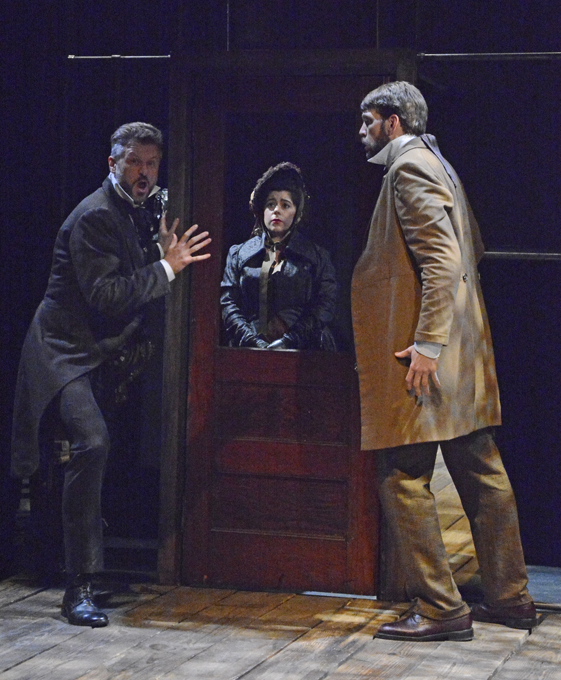Little Opera Theater presents an ambitious and rewarding Carlisle Floyd double-bill

Marc Schreiner, Marie Masters and Jeremy Milner in Carlisle Floyd’s “Markheim” presented by Little Opera Theater of New York. Photo: Tina Buckman
Carlisle Floyd is the Verdi of American opera, which is more than a measure of relative greatness. He is a great opera composer who has written several accomplished works—Susannah and Of Mice and Men are the most famous—that are American in the way that Verdi’s operas are Italian: close to the language, stories, and social customs of the native country. Floyd’s operas are the sound of America singing.
Two of Floyd’s shorter operas, Cold Dusk and Markheim, are currently on stage through the middle of the month, a double bill by the Little Opera Theater of New York that opened Friday night at 59E59 theater. Cold Dusk is the composer’s first opera, one that does not always appear on lists of his works, while Markheim is firmly from his long maturity and mastery as a composer, a great work that fits the time and the season.
Floyd writes his own librettos, and made the point in a recent interview with the San Francisco Chronicle of saying “I firmly believe that more operas are killed by bad librettos than by anything else. I don’t think even a great composer can overcome a bad libretto.”
On his own terms, Slow Dusk (1949), almost works, but ultimately Floyd’s music is unable to overcome the weakness of his own libretto. The story—which began as a Floyd short story—is just a scenario, and a clichéd one at that: forbidden young love struck by tragedy. There is a narrative, but no dramatic theme. On a smaller scale, words are often jammed into unwieldy rhythms and phrases.
But the music has that wonderful, classic mid–20th century American sound: stacked fourths and fifths that carry great weight while leaving space for air and light to flow through, and a sinuous lyricism that hints at populism without ever pandering or condescending.
Those qualities not enough to make this short opera work, though, nor were the committed performances from mezzo-soprano Jennifer Roderer and baritone Alexander Charles Boyd as Aunt Sue and Jess, soprano Sarah Beckham-Turner as Sadie, and tenor Bray Wilkins as her doomed lover, Micah.
Beckham-Turner was particularly strong, putting everything into her rich voice in her concluding aria, and the relationship she and Wilkins conveyed was the high point of the performance. But the singers were not well-served by the orchestra. The fault was less in the playing—although it was at times insecure—than in the chamber arrangement by Inessa Zaretsky. The original orchestral score was reduced to nine strings, harp, flute, oboe, bassoon, horn and percussion, with little skill in transcription to compensate for the loss of color, texture and range. The results were wan, small, and unfair to Floyd (who was in attendance).
Everything about Markheim was better, on paper and on stage. Another one-act opera, though longer and substantial enough to fill its own evening, this piece premiered in 1966. Floyd adapted his libretto from the story of the same title by Robert Louis Stevenson.
The title character is a decadent, dissipated rake of an aristocrat. Having ruined the lives of several working class women, and fled gambling debts, he now fears for his life from “cut-throats,” while his pawnbroker, Josiah Creach, warns him of the men who seek to avenge their wives and relatives.
Markheim brings Creach one last item, a stolen statue (which suffered an inadvertent mishap opening night), for the cash he needs to flee. But Creach, disgusted, finally, refuses, and events take turns boih surprising and violent.
Set on Christmas Eve, it’s a classic English ghost story of the season, and Floyd makes it into a gripping opera. The skillful libretto reveals character and drama, is always singable, and the music is inventive and expressive, constantly upping the drama as the plot takes unexpected turns. This opera demands attention with unsurpassed power, especially when sung with such skill and verve.
Markheimdominates the story, and bass Jeremy Milner dominated the stage. His voice is strong, with a pleasing bluntness, and he sang and moved with a tempestuous agitation, expressing the sense that the character is liable to explode, or implode, at any moment.
He was matched by tenor Scott Six as Creach, a confident, charismatic performance. As the maid Tess, a key fulcrum in the plot, soprano Marie Masters was innocent and compelling.
But this is a two-man show, in two different ways. The showdown between Markheim and Creach becomes an argument between Markheim and a sinister and supernatural Stranger, a vital performance from tenor Marc Schreiner. Transformed into an intense test between evil and—if not good, than honesty and redemption—the drama comes to a sudden, sublime and extraordinary resolution. Suffice to say that the carolers return in the nick of time.
The orchestra, under the quick, exact conducting of Richard Cordova, at times suffered from a lack of consensus over entrances and rhythms. But the chamber arrangement by Raymond J. Lustig was far more successful. Even with Milner’s powerhouse voice, the musical size and texture never felt underdone.
Despite the unevenness of the works, let’s hope that Little Opera Theater’s timely rescue of the great, neglected Markheim should help to restore this late Floyd work to the public consciousness.
Slow Dusk and Markheim continue with alternating casts through December 14. lotny.org






